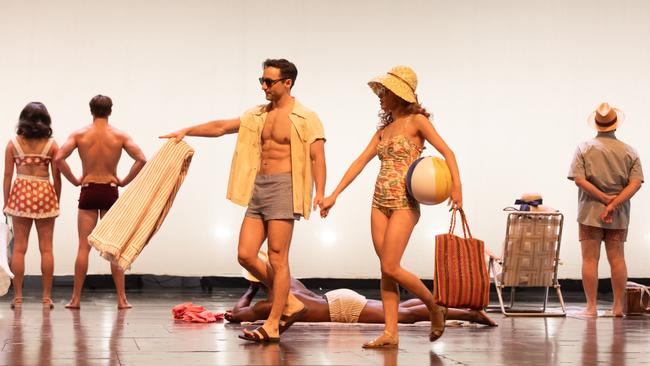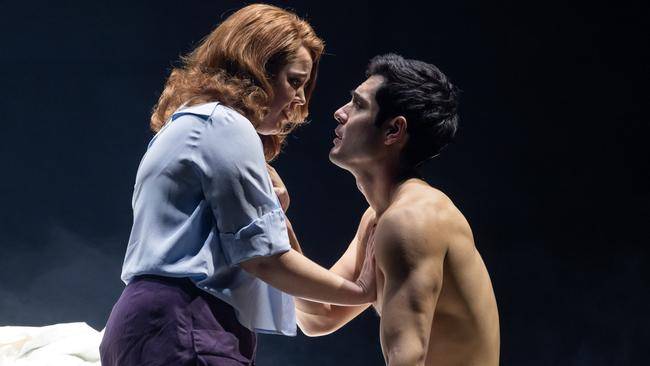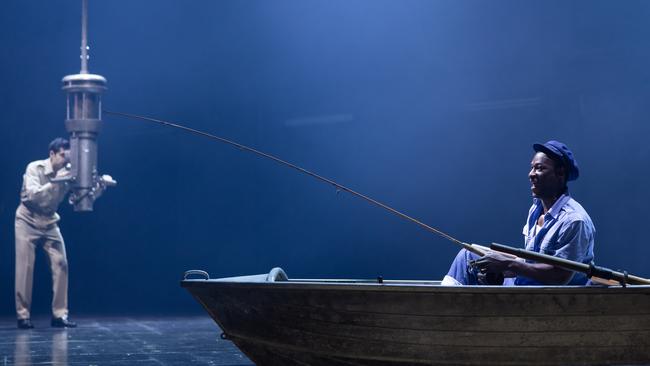Restrained, artificial – end of the world was never meant to be like this
Under Kip Williams’s direction, the characters in On The Beach seldom reach out of this near-empty vastness to touch the heart.

“It’s bloody unfair,” Moira cries theatrically, deep in drink and flirtation. Politicians 8000 miles away in the northern hemisphere (we are in pre-metric Australia, the early 1960s) have lobbed so many nuclear bombs at one another that a vast cloud of radiation is heading south, speedily eliminating human life as it goes.
Dogs and cats will survive perhaps a few weeks longer; rabbits possibly up to a year. Cockroaches don’t get a mention.
Moira’s complaint is gallant, in its way.
She’s not screaming in anguish or consumed with terror. She’s just saying.
Brought to vivid life by Contessa Treffone, Moira is warm, funny and indomitable. She’s the one you remember as the curtain falls on Tommy Murphy’s mostly bloodless and emotionally unengaging adaptation of Neville Shute’s vision of what the end of the world might look like.
Shute wrote his short, pragmatic novel in 1957 with Hiroshima and Nagasaki only just in the rear-view mirror and the bone-chilling shadow of the Cold War overhead.

Today you can insert your own opinion as to which current event poses the greatest existential threat but the central preoccupation of Shute’s novel still applies. What would you do if you knew the end was imminent? How would you behave?
The scene is Melbourne, 1963, where citizens wait for the inevitable and an American submarine commander, Dwight Towers, waits for his next and probably last assignment. Everyone is in a kind of limbo, going on as usual while alertly aware of what’s to come. There’s a wonderful visual metaphor for the situation in designer Michael Hankin’s austere set, which is dominated by a huge bleached curtain that sweeps ominously across the stage. Countering the bleakness is an abundance of bougainvillea that floats into view now and then, bringing a burst of colour, growth and everyday happiness.
Under Kip Williams’s direction, few of Murphy’s characters reach out of this near-empty vastness to touch the heart. Treffone’s Moira certainly does, and Tai Hara gives Towers quiet grace and resolve. It’s a character of the most minor kind, however, who is given the play’s most affecting scene.
Towers’s sub has been sent from Melbourne to investigate a persistent radio signal coming from somewhere near Seattle. There’s a theory, probably crackpot, that radiation levels are diminishing. Is someone still alive in the north?

When they get there Submariner Swain (Elijah Williams) takes the chance to flee. He would rather spend his last few days up on the surface in the sun, trying to catch a fish or two. Overly romantic music by composer Grace Ferguson adds an unwelcome dash of mawkishness but nevertheless the eyes prickle.
Elsewhere the restraint of Shute’s prose turns into flat dialogue and the decency of his characters hardens into artificiality. Murphy also rather ties himself in knots to introduce visions and ghosts of past and future, presumably to add more drama but only muddying the waters.
Murphy keeps intact one of Shute’s most clear-cut statements, although takes it from Towers to give to Matthew Backer’s nerdy scientist John Osborne. Humans, Osborne says, will be wiped out and the world “made clean again for wiser occupants without undue delay”.
You could read that as having hope, one supposes. Murphy certainly offers that in his anodyne ending. Ferguson’s score swells mightily and … well, I won’t do a spoiler other than to say a heavy dose of sentimentality does On the Beach absolutely no favours.
Tickets: $117-$129. Bookings: 02 9250 7777 or online. Duration: 2hrs 20mins including interval. Ends August 12.





To join the conversation, please log in. Don't have an account? Register
Join the conversation, you are commenting as Logout